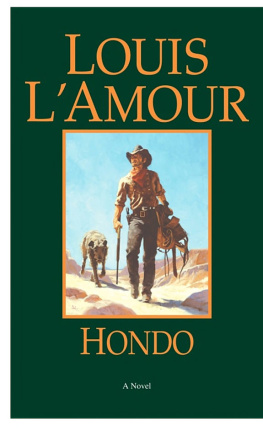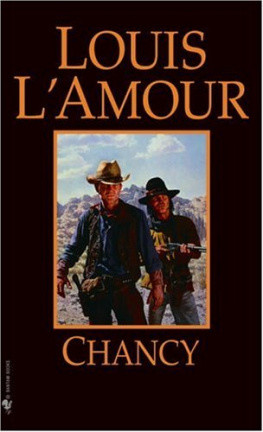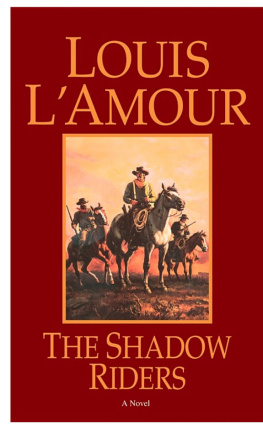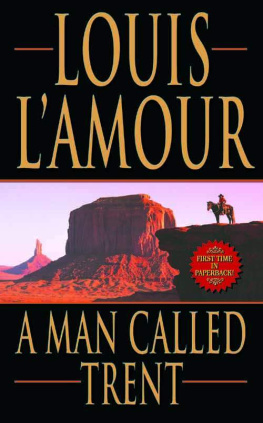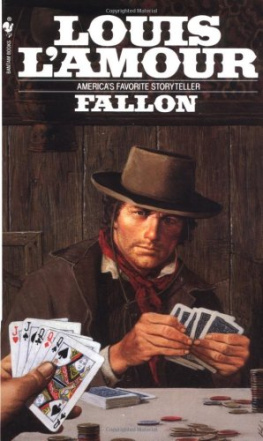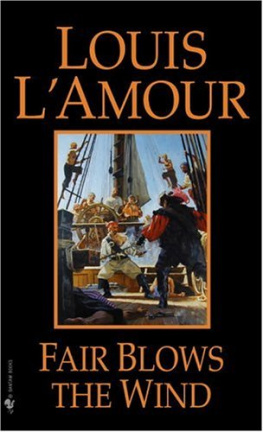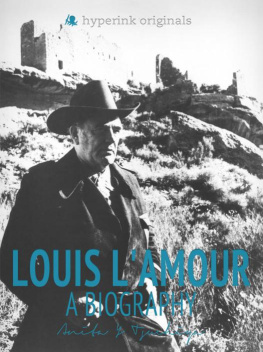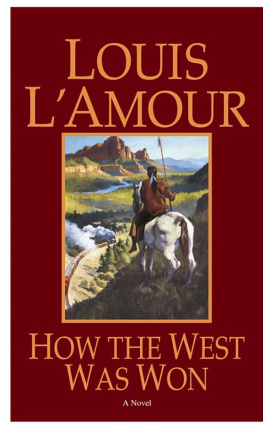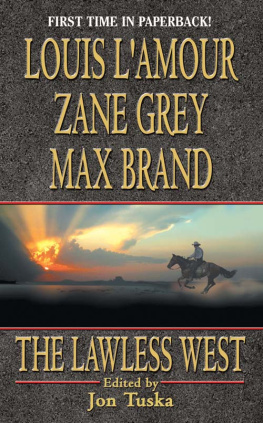Louis LAmour - How the West Was Won
Here you can read online Louis LAmour - How the West Was Won full text of the book (entire story) in english for free. Download pdf and epub, get meaning, cover and reviews about this ebook. year: 2004, publisher: Bantam, genre: Detective and thriller. Description of the work, (preface) as well as reviews are available. Best literature library LitArk.com created for fans of good reading and offers a wide selection of genres:
Romance novel
Science fiction
Adventure
Detective
Science
History
Home and family
Prose
Art
Politics
Computer
Non-fiction
Religion
Business
Children
Humor
Choose a favorite category and find really read worthwhile books. Enjoy immersion in the world of imagination, feel the emotions of the characters or learn something new for yourself, make an fascinating discovery.

- Book:How the West Was Won
- Author:
- Publisher:Bantam
- Genre:
- Year:2004
- Rating:4 / 5
- Favourites:Add to favourites
- Your mark:
- 80
- 1
- 2
- 3
- 4
- 5
How the West Was Won: summary, description and annotation
We offer to read an annotation, description, summary or preface (depends on what the author of the book "How the West Was Won" wrote himself). If you haven't found the necessary information about the book — write in the comments, we will try to find it.
How the West Was Won — read online for free the complete book (whole text) full work
Below is the text of the book, divided by pages. System saving the place of the last page read, allows you to conveniently read the book "How the West Was Won" online for free, without having to search again every time where you left off. Put a bookmark, and you can go to the page where you finished reading at any time.
Font size:
Interval:
Bookmark:
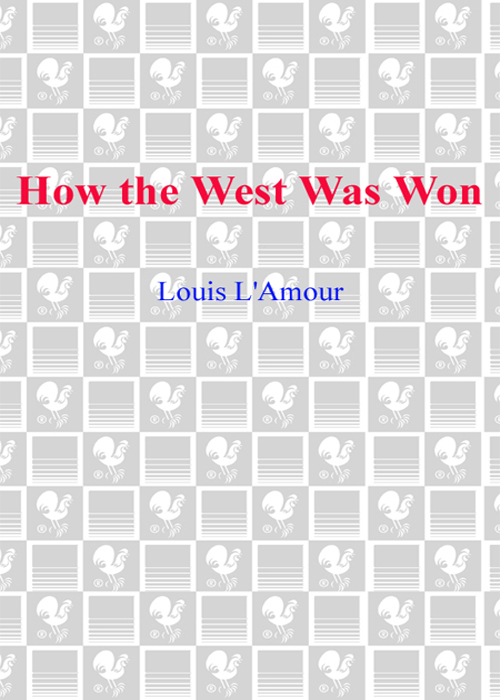
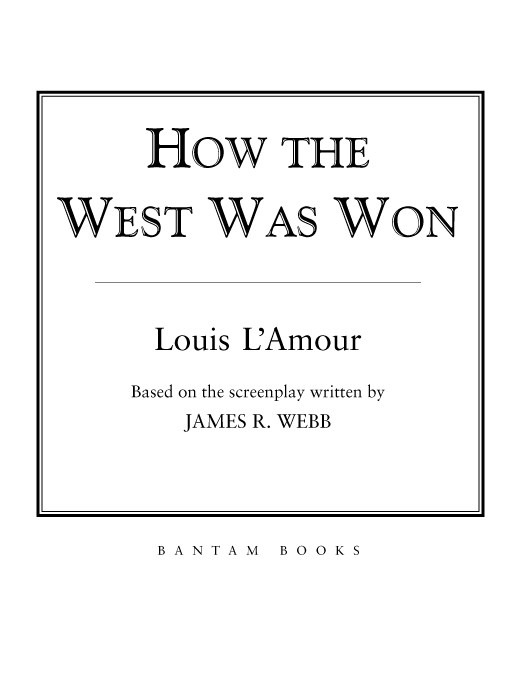
Contents
L AST S TAND
A ND THEN THE Arapahoes came.
They came close upon the heels of the buffalo, and leaping their ponies over fallen beasts, the Indians were behind the barricade among the defenders.
Zeb saw his sergeant go down under the glancing blow of a tomahawk and he fired, knocking the warrior from the saddle. A horse plunged at him and he fell aside, firing and missing.
A young warrior, his face painted with streaks of black, rushed at him, and Zeb lifted his pistol and fired. The bullet stopped the Indian in midstride, but then he came on and Zeb fired again. When the Indian fell three bullets were in his breast and he went down on top of Zeb.
Catching up a rifle, Zeb scrambled to his feet and shot an Indian near the barricade. Then he wheeled to fire again, but the gun was empty and he charged a group of Indians, swinging the heavy Springfield like a club.
Part One
The Rivers
The shining land lay openready for conquest, and the ways into it were the rivers. Slow and mighty, turbulent and frothing, the rivers were the roads the first settlers took, building rafts, and flatboats, floating down water that was green, brown, black, flecked with foam, but that led ever onward into the heart of that dangerous but unawakened land where riches waited for the bold and the strong.
Chapter 1
T HE SUN WAS not an hour high when Linus Rawlings came upon the trail of the Ute war party. The high walls of the narrowing valley of the Rio Grande barred all escape, and Linus knew he was in trouble.
A man of infinite patience, he was patient now, sitting his line-backed buckskin in the dappling shadow of the aspens. Behind him trailed three pack horses carrying his winters catch of furs, while before him the mountain slope lay bright with the first shy green of spring.
Nothing moved along that slope, nor in the valley belowonly the trembling leaves of the aspen. Linus, never one to accept the appearance of things in Indian country, remained where he was.
Against the background of the aspens he was invisible as long as he remained still, for his clothing, the horses, and their packs were all of a neutral color, blending well with their surroundings. Methodically, his eyes searched the slope, sweeping from side to side, taking in every clump of brush or aspen, every outcropping of rock, each color change in the grass.
It had been a long time since Linus Rawlings had sky-lined himself on the top of a ridge, or slept beside a campfire. He had known men who did both thingsthey were dead now. It was no accident that he always stopped with a background against which his shape could offer no outline.
When in Indian country you never took a risk, whether you suspected an enemy to be near or not. You learned also to make a fire that was small, on which to prepare your meal, and after eating to shift your camp a few miles and sleep in darkness, without a fire.
Such things as these were the simple rules of survival in the Indian country; and besides these, there were othersnever to take a step without a weapon, as well as to observe the movements of birds and animals as indications of danger. Linus no longer even thought about the necessity of doing such things, for they had become as natural as breathing.
He saw that the Ute war party comprised a dozen Indians; and if they were headed for a raid on the Spanish settlements to the south, they might well plan a rendezvous with other Indians along the trail. They were only minutes ahead of him, and the question wasdid they know he was behind them?
He studied the slope with a skeptical eye. Behind his lazy, easygoing faade, Linus Rawlings mind had been sharpened and his senses honed by thirty-two years of frontier living. Born in the dark forests of western Pennsylvania, where his family had been among the first to settle, Linus had moved west with his father to Illinois when only fifteen, and shortly after his fathers death he had taken up with a keelboat outfit and had gone west to trap fur.
In the sixteen years that followed he ranged from the Kootenal River in Montana to the Gila in Arizona, from the shores of the Pacific to the eastern slopes of the Black Hills. He trapped in company with Jim Bridger, Uncle Dick Wootton, Bill Williams, Joe Walker, Osborne Russell, and Jedediah Smith. In those years he left the mountains only twice, aside from a brief visit to the Pueblo of Los Angeles. Those two trips away from the mountains were to St. Louis and New Orleans.
Now Linus searched out the probable line of travel of the war party and studied it with care, but he could see no movement, nothing. But he recalled what Kit Carson had told him many years before: When you see Indians, be careful. When you do not see them, be twice as careful.
Linus had great respect for the Indian. He knew him, not as a poor heathen of whom the white man took advantage, but as a fierce fighting man who lived for war horse-stealing. The Indian knew the wilderness, and how to live with it. No cat could move more quietly, no hawk had a keener eye; for the Indian lived by and with his senses, and a man could survive in Indian country only by being a better Indian.
Time laggedthe morning sun touched the ridges behind him with gold. The grass was still; only the aspens trembled. A pack horse stamped impatiently, a bee buzzed lazily in the low-growing brush.
His rifle lay in front of him across the saddle, the muzzle pointing down slope, his right hand grasping it around the action, thumb resting on the hammer.
Below him and to the right was another, somewhat larger clump of aspen. He gauged its height and his own position. To reach it he need be visible for no more than a minute.
A slight breeze moved behind him dancing the aspen leaves and stirring the grass, and when the breeze and its movement reached him, he moved with its movement, keeping the first clump of aspen behind him. He paused again when he had rounded the second clump, then started down the slope on the opposite angle to that he had been using.
A short distance ahead the narrow valley narrowed still more; then it widened out until it finally opened upon the plains. If the war party knew of him and planned an ambush, that would be the place. Not in the narrows, but just before they were reached or just after leaving them.
When approaching a dangerous place a travelers attention is directed ahead, toward the likely spot for an ambush, and he overlooks the seemingly innocent ground he is just about to cross. After passing a dangerous place, there is a tendency to let down.
Linus was in no hurry. The fleshpots of the East could wait a few hours or a few days longer. Using infinite care and holding well to the side of the valley, he worked his way along the bottom of the valley, following the river and keeping close to the trees or under them.
When he reached the place where the Utes had crossed, he drew up and allowed his horses to drink, and when they had drunk their fill he dismounted and drank himself, choosing a spot upstream from the horses. He was rising from the ground when he heard the shot.
He remained where he was, without changing position, listening.
How far off? A half mile? A mile?
The second shot barked hoarsely, followed by three more shots fired in rapid succession, one of them overlapping a previous shot.
Stepping into the saddle, he crossed the stream and pushed on, keeping in the shadow of the trees. When he approached a rise in the ground where the stream dipped through a cut, he left the stream and mounted the rise until his eyes could look over the top.
Next pageFont size:
Interval:
Bookmark:
Similar books «How the West Was Won»
Look at similar books to How the West Was Won. We have selected literature similar in name and meaning in the hope of providing readers with more options to find new, interesting, not yet read works.
Discussion, reviews of the book How the West Was Won and just readers' own opinions. Leave your comments, write what you think about the work, its meaning or the main characters. Specify what exactly you liked and what you didn't like, and why you think so.

